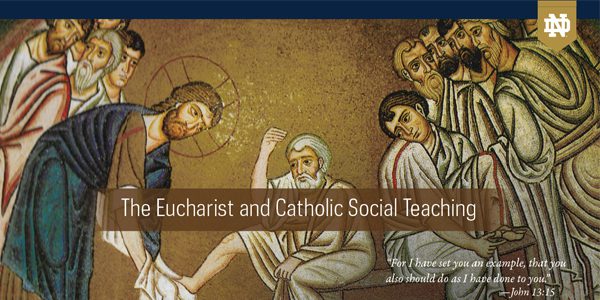Inspiring Conversations: Leading People in an Ever-Changing World – Dave MacLennan, Chief Executive Officer of Cargill
Subscribe to the ThinkND podcast on Apple, Spotify, or Google.
Featured Speakers:
- Dave MacLennan, Chairman and Chief Executive Officer, Gargill
This session of the Inspiring Conversations Series featured a discussion about global leadership with guest speaker Dave MacLennan, the chairman and chief executive officer of Cargill. This virtual event was led by Tom Schreier (‘84), the founding director of the Inspired Leadership Initiative. Through this discussion, MacLennan demonstrated ways in which leaders can foster a healthy work culture, encourage sustainability, and give back to the community in more ways than one.
At the beginning of the discussion, MacLennan described how he leads and makes decisions with the scale of enterprise he operates at—160,000 people work at Cargill, with the company doing business in over seventy countries and selling to 125 countries. MacLennan described that, as a result of this responsibility, he made sure at very high levels of trust and transparency, specifically through his direct reports. Through creating a culture of transparency and honesty, MacLennan assured his employees that he has their backs.
In speaking of the pandemic’s effect on the leadership and culture of Cargill, MacLennan explained that it is difficult to lead over Zoom, for there is truly no substitute for face to face interaction. Additionally, MacLennan explained that he recognized the strain that the pandemic placed in his people’s lives; mental health and a lack of motivation became the center of conversation. As a result of these difficulties, Cargill worked hard on communication in order to support colleagues around the world, including having a psychologist as his team’s executive coach to provide consultation. Although the pandemic had a huge impact on culture, MacLennan made sure to show his encouragement and concern on his end as the CEO. Then, MacLennan touched on the pandemic’s effect on the business aspect of Cargill. The coronavirus had a huge impact on the protein business, where the plants were made up of a large number of workers in close proximity to each other. Inspired by the belief that people should always come ahead of profits, MacLennan led Cargill in placing all safety measures possible, from temperature screening to slowing down the speed of production to staggering shifts. As a result, Cargill only closed down three of their plants in the early stages of the pandemic.
In the next topic of the discussion, MacLennan delved upon the meaning of Cargill’s statement of purpose, which is “to nourish the world in a safe, responsible, and sustainable way.” MacLennan explained that both Cargill’s workers and he hold themselves accountable in making their supply chains all around the world more sustainable, constantly asking “How can we use less water? Less land?” As a result, they created measurable, transparent, and ambitious goals for the company.
Describing the products of Cargill, MacLennan explained that Cargill creates ingredients that customers use and people consume; the ultimate goal of such a company is to place food on the table of those who need it. MacLennan explained that, although there are many logistics and numbers involved in the business, the food and the people in need of nutrition always come first. Additionally, MacLennan also touched on the role of innovation in Cargill’s food supply and how Cargill is working towards the advent of plant-based protein and alternatives to animal-based protein.
In the Q&A portion of the virtual event, MacLennan answered a wide range of questions, touching on the importance of community and the importance of human rights at Cargill. He explained Cargill’s commitment to rural communities: 1. Respect the natural resources of the community, and 2. Remember that you are guests in their environment. As a result, Cargill placed much emphasis on giving back to the community through encouraging education and teaching farmers in these communities.
MacLennan ended the discussion by conveying the importance of human rights. He explained that Cargill takes human rights very seriously; it is a core part of the organization. MacLennan stated, “It’s not just about making food, it is also about training farmers, putting money back in the community, and doing things that they need to have access to food and nutrition.” Through this quote, MacLennan conveyed the importance of philanthropy in leading a business.
- In his style of leadership, MacLennan consistently aims to foster a culture with very high levels of trust and transparency. In creating an environment of honesty, MacLennan assures his coworkers that he has their backs. (5:00)
- People’s mental health and emotional health have been extremely impacted and strained by the coronavirus pandemic. As a result, leadership should show support and make sure to put people first. (11:58)
- Cargill’s statement of purpose is “to nourish the world in a safe, responsible, and sustainable way.” (17:04)
- It is extremely important to give back to the community, in both financial terms as well as philosophical and cultural terms. That way, you show respect for your workers, the environment, and the community members as a whole. (39:48)
- Involvement in human rights is an important duty of any organization as large and as community-oriented as Cargill. (46:00)
- “With each month that passes, the strain on people’s lives, the ability to maintain personal connections amongst coworkers, the stress on people’s emotional health (especially those with children at home) become more and more intense.” (Dave MacLennan, 11:58)
- “People always always came ahead of operations and profits.” (Dave MacLennan, 15:56)
- “We’re making food. Food should not be a subject of trade disputes, it should get to where it’s needed. It should get to where people are hungry and need nutrition. When you start using food as a weapon, the world becomes a much more fraught and tenuous place.” (Dave MacLennan, 24:21)
- “If you wait until you get every t crossed and every i dotted, you’re going to lose a market opportunity or it’ll be too late to make a decision.” (Dave MacLennan, 41:26)
- “It’s not just about making food, it is also about training farmers, putting money back in the community, and doing things that they need to have access to food and nutrition.” (Dave MacLennan, 48:55)
Related Content
Eucharistic Abundance and Social Regeneration
In 2022, the United States Conference of Catholic Bishops (USCCB) announced that the Church in this country would undertake a Eucharistic Revival, as a way to bolster Catholics’...
View EventHow Cities Speak To Us
Professor Emily Talen joins the School of Architecture to share her work at The Urbanism Lab and its focal point at the University of Chicago for the study of the built...
View EventThe Black National Anthem & Parent’s Signing Off On Children Reading Black Books
In this week’s episode, Isaiah and Tykiera talk about some tweets about Black people that took Twitter by storm. They also talk about The Black National Anthem, Lift Every Voice...
watch video


